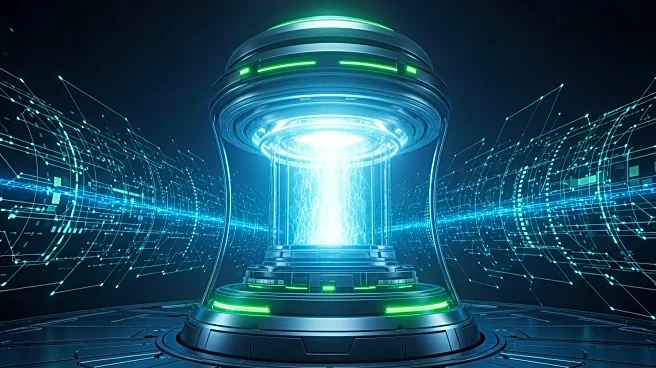What's Happening?
The United States is experiencing a significant increase in electricity demand due to the proliferation of data centers, particularly those utilizing artificial intelligence (AI) technologies. This surge has led to a renewed interest in nuclear energy as a reliable and low-emission power source. Studies have shown that AI data centers consume vast amounts of electricity, with one study from Cornell University estimating that generative AI uses 33 times more energy than task-specific software. As a result, major tech companies like Meta and Microsoft have entered into power supply agreements with nuclear energy providers to ensure consistent and reliable power for their operations. Additionally, Holtec Corporation plans to build two small modular reactors in Michigan, which are expected to boost the local economy and create jobs.
Why It's Important?
The growing demand for electricity from data centers has led to increased wholesale electricity prices, affecting consumers across various states. This situation underscores the need for reliable and sustainable energy solutions, with nuclear power emerging as a viable option. The interest in nuclear energy, particularly small modular reactors, is driven by their potential to provide baseload power with a low-emission footprint. As electricity costs continue to rise, nuclear energy could play a crucial role in stabilizing prices and supporting the energy needs of the tech industry and beyond. The shift towards nuclear energy also highlights the broader implications for energy policy and the transition to sustainable power sources.
What's Next?
The construction of small modular reactors, such as those planned by Holtec Corporation, is expected to proceed, with completion anticipated in the early 2030s. These projects could serve as a model for future nuclear energy developments, providing insights into the feasibility and economic impact of small modular reactors. Additionally, the Tennessee Valley Authority's selection of NuScale's small modular reactor design for new generation capacity across seven states marks a significant step in the adoption of this technology. As nuclear energy gains traction, stakeholders in the energy sector, including policymakers and businesses, will likely continue to explore its potential to address rising electricity demands and environmental concerns.
Beyond the Headlines
The resurgence of nuclear energy, driven by the demands of data centers, raises important ethical and environmental considerations. While nuclear power offers a low-emission alternative to fossil fuels, concerns about safety, waste management, and public perception remain. The development of small modular reactors presents an opportunity to address these issues, potentially leading to safer and more efficient nuclear power solutions. Furthermore, the reliance on nuclear energy by major tech companies highlights the intersection of technology and energy policy, prompting discussions on the role of corporate responsibility in sustainable energy practices.












